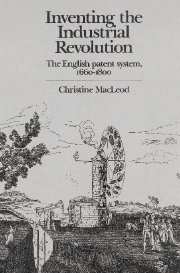Book contents
- Frontmatter
- Contents
- List of tables and figure
- Acknowledgements
- List of abbreviations
- Notes on style
- Introduction
- 1 Patents 1550–1660: law, policy and controversy
- 2 The later-Stuart patent grant – an instrument of policy?
- 3 The development of the patent system, 1660–1800
- 4 The judiciary and the enforcement of patent rights
- 5 The decision to patent
- 6 Invention outside the patent system
- 7 Patents in a capitalist economy
- 8 The long-term rise in patents
- 9 The goals of invention
- 10 Patents: criticisms and alternatives
- 11 A new concept of invention
- Notes
- Bibliography
- Index
1 - Patents 1550–1660: law, policy and controversy
Published online by Cambridge University Press: 28 October 2009
- Frontmatter
- Contents
- List of tables and figure
- Acknowledgements
- List of abbreviations
- Notes on style
- Introduction
- 1 Patents 1550–1660: law, policy and controversy
- 2 The later-Stuart patent grant – an instrument of policy?
- 3 The development of the patent system, 1660–1800
- 4 The judiciary and the enforcement of patent rights
- 5 The decision to patent
- 6 Invention outside the patent system
- 7 Patents in a capitalist economy
- 8 The long-term rise in patents
- 9 The goals of invention
- 10 Patents: criticisms and alternatives
- 11 A new concept of invention
- Notes
- Bibliography
- Index
Summary
Over the last two centuries, the word ‘patent’ has come to have a precise and technical meaning: a grant of monopoly powers over the commercial exploitation of an invention for a limited period. This conceals its origin. William Blackstone, the jurist, writing in 1768, was still familiar with the broader understanding of the word, in which a patent for invention was but one type of royal ‘letters patent’:
The king's grants are also a matter of public record … These grants, whether of lands, honours, liberties, franchises or ought besides are contained in charters, or letters patent that is, open letters, litterae patentae, so called because they are not sealed up, but exposed to open view, with the great seal pending at the bottom: and are usually directed by the king to all his subjects at large.
Thus letters patent were simply the document by which special privileges were conferred. Grants for invention were a relatively late arrival on the administrative stage, and were regarded as just one more instrument of royal policy. This meant that they were recorded indiscriminately on the patent rolls, among grants of land, office, honours, and other perquisites in the royal gift.
ELIZABETHAN AND EARLIER PATENTING PRACTICE
There are records since the reign of Edward III of ‘letters of protection’, given by the English crown to named foreign craftsmen, mainly weavers, saltmakers and glassmakers, with the intention of encouraging them to settle in England and transmit their skills to native apprentices. These grants did not confer any exclusive privilege or monopoly.
- Type
- Chapter
- Information
- Inventing the Industrial RevolutionThe English Patent System, 1660–1800, pp. 10 - 19Publisher: Cambridge University PressPrint publication year: 1988



